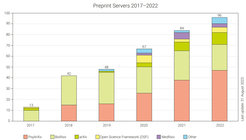Open Science
Last update: August 2023
The importance of Open Science continues to grow. During the reporting period, the MPI for Human Development engaged in various activities to make research outputs freely and easily accessible and to increase the transparency of the research process as a whole. These activities primarily targeted Open Access, open data, open materials, and open source software. A working group set up by the Institute's Board of Directors in 2018 coordinated these activities.
One focus of the Open Science activities has been on providing an extensive range of information and workshops. These included workshops on data documentation with the codebook package developed by Ruben Arslan, researcher at the Institute (Arslan, 2019), on software version control with Git, on computational reproducibility, and on the Brain Imaging Data Structure (BIDS). Due to COVID-19, most of these workshops took place online; their contents, in the form of video recordings and slides, have been made permanently available for current and future Institute members on the Institute’s intranet.
Science-led development of tools to support Open Science practices also continued; these include the establishment of best practices for reproducible research (Peikert et al., 2021; Peikert & Brandmaier, 2021; Van Lissa et al., 2021) and the development and publication of the accompanying R packages repro (Peikert et al., 2021) and WORCS (Van Lissa et al., 2021). In this context, scientists also actively contributed to the debate about implementing Open Science practices, such as preregistration (Peikert & Brandmaier, 2023). Data as well as materials were made openly available for others to reuse, with particular attention to computer code. These were sometimes a byproduct of the project (e.g., Buchberger et al., 2022; Ernst et al., 2022; Kosciessa et al., 2020; Moneta et al., 2023; Sommer et al., 2022; Wittkuhn & Schuck, 2021) aimed at increasing transparency, reuse, and replicability of empirical findings, and at other times they were the key outcome of the research, for example the proposal of new statistical or computational tools (e.g., Arnold, Voelkle, & Brandmaier, 2021; Ernst & Peikert, 2023).
In order to quantify the publication of data, a workflow that is applicable to research activities across the Institute was created with colleagues from the Library and Research Information Unit. The workflow enables the monitoring of whether a given publication includes open data as well as information about the storage site.
The trend towards publishing research results as preprints using various preprint servers (in particular PsyArXiv, BioRxiv, and arXiv), which had already been apparent for some time, continued impressively, as figure 1 shows.

The increase in the proportion of institutional publications available in Open Access (OA), namely journal articles, is also highly visible. An overview of the development from 2020 to 2022 is provided in figure 2. Here, a distinction is made between the proportion of articles in original OA journals (“gold OA”), articles in journals subject to subscription (“hybrid OA”), and articles that were initially published in “closed access” but were then republished in an OA version (“green OA”) on the basis of corresponding legal regulations.

The steady increase in OA publications was possible due not only to centrally funded Max Planck Society publication contracts, but also to newly established Library and Research Information services at the Institute. Through the partial reallocation of literature acquisition funds, in May 2020 a local fund was established for the criteria-based funding of OA articles and books for which no or only partial funding is available from central Max Planck Society funds or from third-party funds. As a result, four major OA book projects were funded at the Institute for the first time until 31 August 2023, as well as eleven journal articles. In addition, a workflow for systematic, legally secure OA secondary publication of articles that were originally only accessible in “closed access” was successfully implemented in September 2021. If permitted by legal or contractual requirements, this ensures that such content is made freely available as early as possible and in a form that is as citable as possible. The authors of the corresponding articles merely have to authorize the Institute to carry out a secondary publication on their behalf and have no extra burden of work.
Due to the COVID-19 pandemic, the development of an Open Science policy for the MPI for Human Development had to be postponed, but this process is set to continue. Independently of this, starting in 2023 the Institute will offer an annual Open Science Innovation Award for one individual and one group. This is intended to promote innovative Open Science projects and at the same time present them as part of an in-house event, in order to anchor Open Science even more firmly at the Institute across Centers and Research Groups.
Since Open Science thrives on exchange, the Institute is actively involved in various networks and working groups related to it. Since spring 2020, the MPI for Human Development has been a member of ENABLE!, a network of various stakeholders (e.g., libraries, publishers) for the realization of OA publication projects. In addition, the Institute, represented by the Library and Research Information Unit’s OA team, participates in a Max Planck Society cross-institution OA working group, which was founded at the end of 2020. Finally, in the summer of 2021, the Institute joined the German Reproducibility Network (GRN), an interdisciplinary consortium of various research institutions in Germany that aims to increase the trustworthiness and transparency of scientific research through joint initiatives. In a regional context, the Institute participated in the organization and implementation of the first virtual Open Access Week for Berlin-Brandenburg, with five online events between November 2021 and March 2022. Two members of the Institute are also involved in the Open Science Panel recently established by the Max Planck Society, which is to help develop an Open Science strategy for the Max Planck Society in the medium term.
Key References

